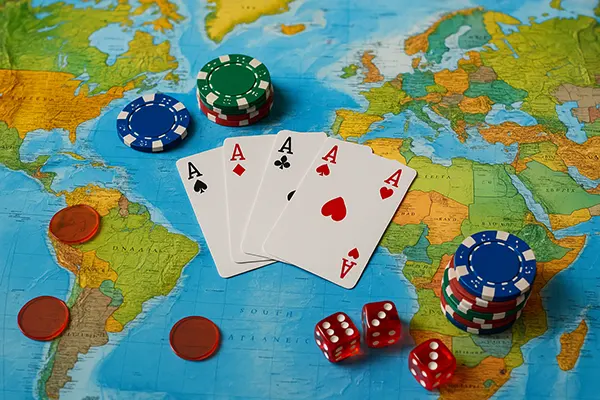
Poker Markets Expanding Rapidly: New Jurisdictions, Cultural Traits, and Future Outlook
Poker continues to evolve in 2025 as several regions introduce clearer regulatory frameworks, attract major operators, and build strong local communities. These markets show stable growth driven by demographic shifts, legal clarity, and rising interest in competitive formats. The following overview highlights regions moving forward most actively, along with cultural nuances and indicators shaping their long-term development.
Asia-Pacific Regions Entering a New Stage
The Asia-Pacific region demonstrates an impressive rise in regulated poker activity thanks to governments adopting licensing systems and international operators investing in local events. India remains one of the strongest examples, with states expanding regulation and the number of online tournaments growing significantly year over year. The combination of a large population and improving legal definitions provides stable conditions for market growth.
Japan shows increasing interest in competitive poker formats after the introduction of “integrated resort” legislation and the rapid spread of training clubs. Although online play remains restricted, the offline tournament scene has become one of the most vibrant in the region. This interest is expected to influence future regulatory decisions as local authorities assess economic benefits.
Australia continues to strengthen its presence through established tournament circuits and a loyal community of experienced players. Despite restrictions on online poker, offshore participation and live events remain popular. The country’s well-developed sports culture supports poker’s presence as a skill-based discipline.
Cultural Influences on Asian Poker Growth
Cultural preferences play a crucial role in shaping Asia-Pacific poker behaviour. In India, many players treat poker as a strategic mind sport similar to chess, which helps normalise the activity in public opinion and supports the expansion of educational platforms. This perception encourages responsible approaches and reduces stigma associated with card games.
Japanese players tend to focus on discipline, theory, and structured practice, which makes the local community highly competitive. Training clubs create an atmosphere where strategy discussions and coaching sessions are common, giving the region a reputation for analytical and methodical gameplay. This approach attracts brands investing in advanced tools and structured events.
In Australia, poker blends with the broader entertainment and sports scene. Local players often participate in events connected to major cities’ cultural festivals, which contributes to strong attendance and media coverage. The mixture of leisure and competitive ambition strengthens the long-term stability of regional tournaments.
Latin America Emerging as a Strategic Hub
Countries across Latin America show sustained growth due to updated regulations, international operators entering the region, and expanding tournament schedules. Brazil is the strongest example, driven by a passionate community and effective cooperation between tournament organisers and local authorities. Brazil’s consistent presence in global rankings signals a mature and expanding environment.
Mexico is currently refining its regulatory framework, creating expectations for clearer rules regarding online poker operations. Improved telecommunications infrastructure and a young population contribute to the long-term potential of this market. Interest in professional play increases each year as more international events take place in major cities.
Argentina offers significant potential thanks to its established live poker scene and strong regional tournaments. Economic challenges impact short-term spending, yet the local community remains active, and operators continue to invest in competitive events. Stable regulatory progress could position Argentina among the top poker markets in South America.
Local Behaviours Driving Latin American Expansion
Brazilian players are known for dynamic, aggressive playstyles that influence global strategies. This stylistic identity creates a recognisable image for the region and strengthens its presence in international competitions. High engagement on social media contributes to growing interest among new players.
Mexican poker culture is expanding through online communities that exchange strategy insights and discuss major tournaments. These communities promote responsible participation and contribute to the development of an informed player base. As regulations evolve, these groups are likely to play an important role in shaping market expectations.
Argentina maintains strong traditions in live poker, particularly in Buenos Aires and Mendoza. Players value social interaction around the game, which keeps attendance high even during economic fluctuations. Local tournaments often integrate regional elements, strengthening cultural identity within competitive poker.

Europe’s Newly Regulated Zones Strengthening the Market
Europe remains a key region for poker, with new jurisdictions updating rules to meet modern standards. Several Eastern European countries have introduced clearer licensing systems since 2023, resulting in renewed operator interest. The combination of improved regulation and growing tourism supports a healthy expansion.
Germany, despite strict limitations in previous years, is undergoing gradual adjustments to its regulatory framework. While taxation remains a challenge, the country’s large population and strong interest in strategy-based games sustain the demand for poker. Analysts expect regulatory improvements by 2026, which could restore the market’s earlier momentum.
Nordic countries continue to influence global poker development thanks to active player communities, advanced analytics tools, and high participation in international events. Sweden and Finland remain particularly strong despite local restrictions, relying on well-organised clubs and stable interest in strategic gaming.
European Cultural Dynamics Shaping Poker Trends
Eastern European players often favour long-format tournaments and deep-stack structures, creating a gameplay style that focuses on endurance and technical play. This approach gains recognition among international organisers who design events based on regional preferences. The strong grassroots community further reinforces the market’s resilience.
German players traditionally demonstrate analytical and mathematically grounded strategies. This style of play, combined with a solid educational ecosystem, ensures that the country remains a significant contributor to global poker rankings. Even with regulatory limitations, Germany retains its reputation for producing high-level competitors.
In Nordic countries, the culture of efficiency and fairness translates into a preference for transparent rules and well-structured tournaments. Players from Sweden and Finland frequently use advanced software tools and participate in coaching groups, strengthening the analytical direction of European poker.





